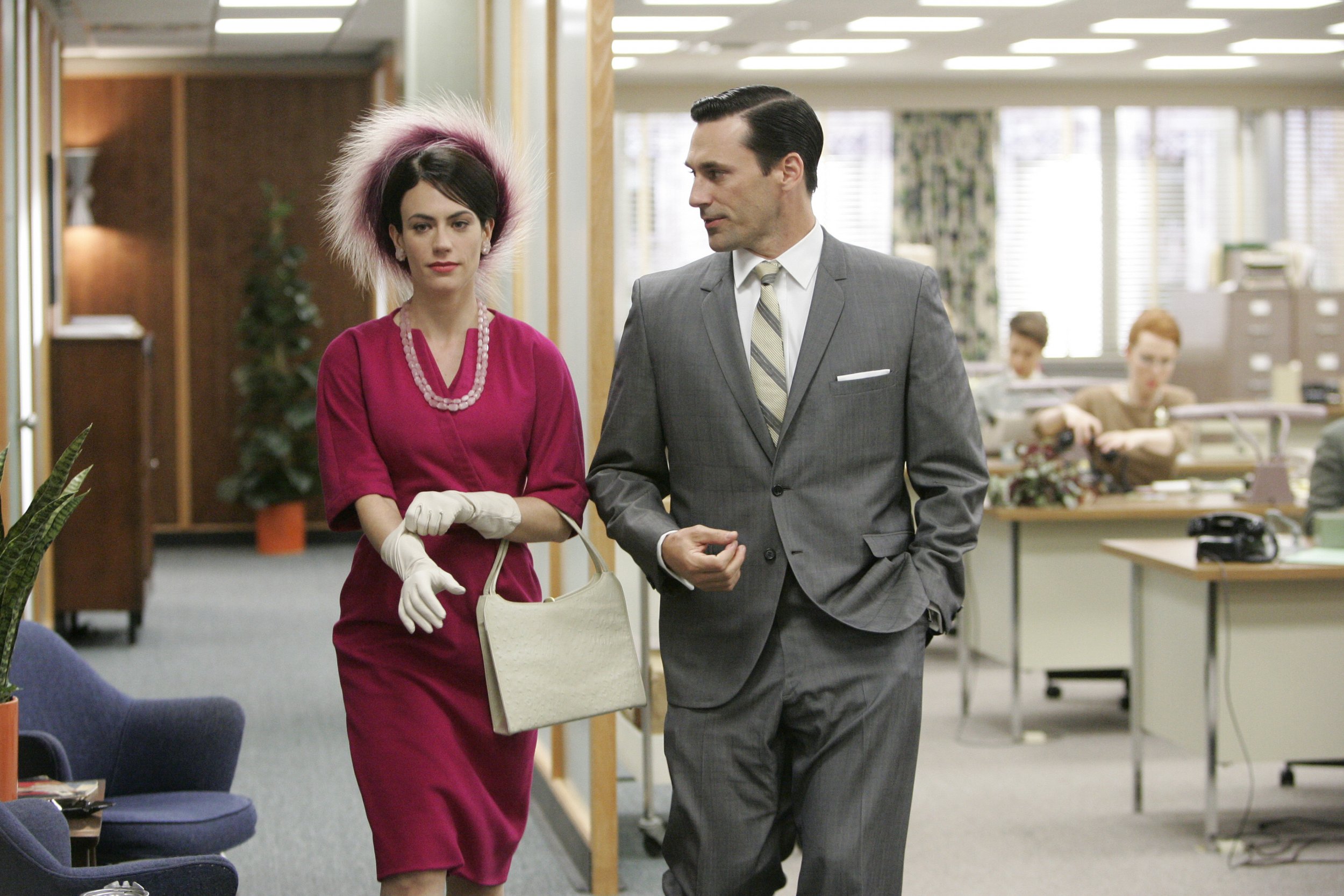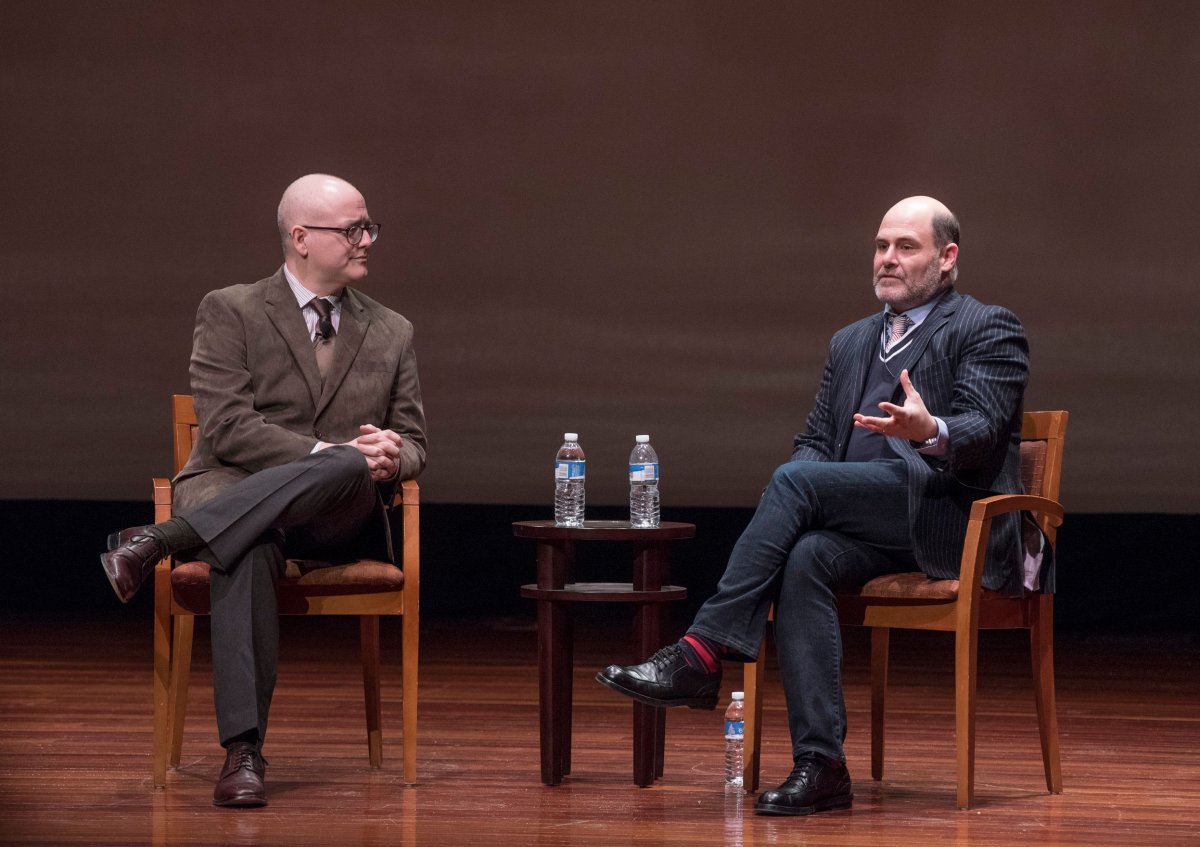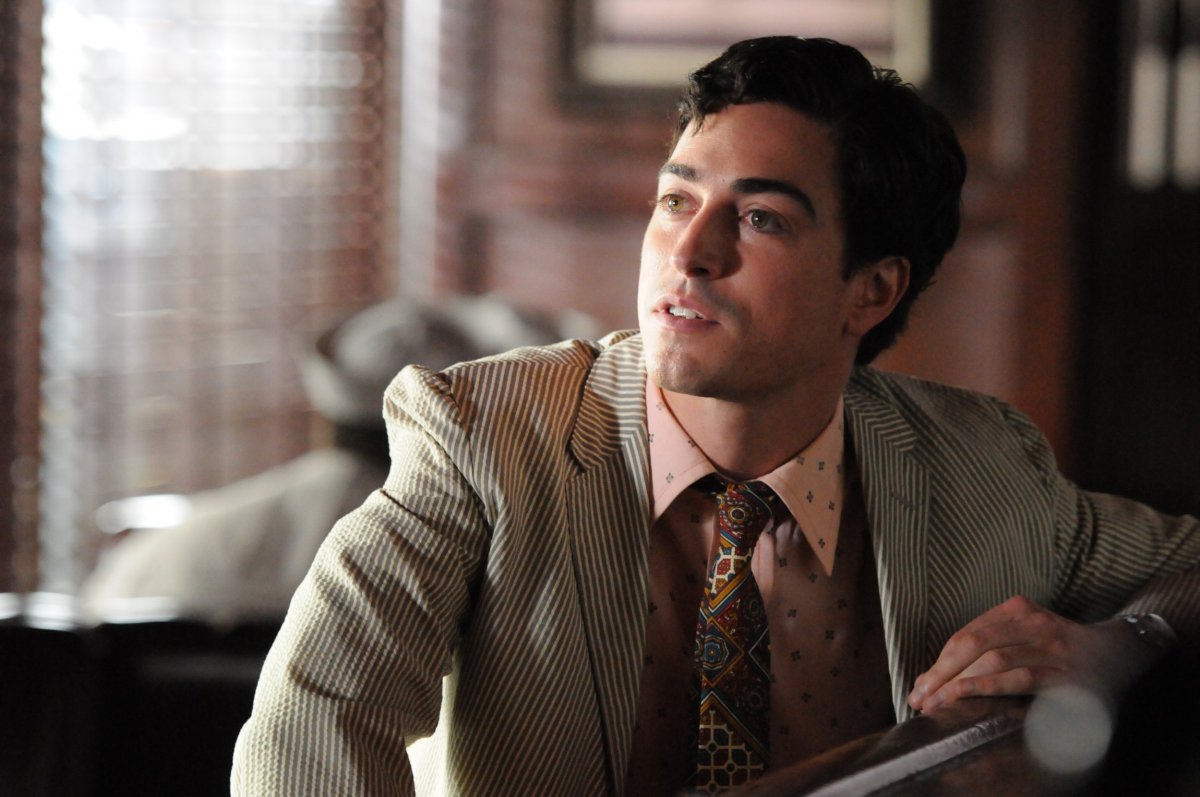
"To Don, we are boat people," says Matthew Weiner, creator of the acclaimed series Mad Men. Weiner was sitting onstage at the Museum of Jewish Heritage at the southern tip of Manhattan on a recent Sunday afternoon, telling a packed theater what lead character Don Draper thought about Jews. As Draper's wife Betty described it, to him they were those skinny people arriving on the shores of America after World War II.
In season one, representatives from Israel's tourism bureau arrive at the swank offices of the show's fictional advertising agency, Sterling Cooper. For Draper, the rising star at the firm, this is one client, and "product," he cannot quite figure out. His associations with Israel are kids in blue and white, kibbutzim and oranges, and the horrific recent history that had ultimately led to its creation.
In advance of the show's final seven episodes, Weiner sat down with Matt Zoller Seitz, a New York magazine critic and editor of RogerEbert.com, to "discuss how the series became not just the story of the rise of advertising, but of a generation of Jews coming into their own in post-war America," said the museum's description of its event. MJH presented the talk in conjunction with its exhibit Designing Home: Jews and Midcentury Modernism, which opened on March 31. The final seven half-season episodes of Mad Men begin April 5. That's Easter Sunday, or the third night of Passover, Weiner pointed out.

Soon after they began talking, Seitz made a comment about the sexist, racist jokes that stand out to viewers watching the show.
"Right, that doesn't happen ever anymore," Weiner joked.
Offhand anti-Semitic remarks run alongside racism, sexism and homophobia in the series, which doesn't tiptoe around the uncomfortable truths of the era.
"You didn't wait," said Seitz, pointing to the early inclusion of questionable attitudes toward Jews and other minority groups on the show "right out of the gate."
"This is the story of what it's like," Weiner said, explaining that he wanted to depict socially realistic, recognizable human behavior.
In the show's pilot, Sterling Cooper partner Roger Sterling walks into Draper's office and asks if the firm has ever hired any Jews. "Not on my watch," Draper replies. The clip—one of many shown during the two-hour event—ran on a large screen behind Weiner and Seitz, who became tiny silhouetted figures against the 1960s advertising world.
As Draper casually makes his offensive comment—which Weiner calls "sophisticated anti-Semitism"—he's pulling out out a fresh white shirt from his desk drawer. They have a meeting with potential clients from Menken's department store, owned by a Jewish family. Roger says he wishes they had a fellow Jew they could pull into the meeting to make the Menkens feel "comfortable."
"You want me to run down to the deli and grab somebody?" Draper asks. In the end, they pull someone from the mailroom into the meeting, where shrimp cocktails are laid out on the table. Though Rachel Menken tends toward the assimilated side of the spectrum—she says in a later episode "I'm American. I'm really not very Jewish."—it remains notable that Sterling Cooper is serving her refreshments that aren't kosher.
When account executive Pete Campbell asks why they've come to Sterling Cooper—rather, he implies, than to a Jewish firm—Menken says, "If I wanted some man who happened to be from the same village as my father to manage my account, I could've stayed where I was."
Menken, who is not only Jewish but a woman doing business among men, rubs Draper the wrong way. "I'm not gonna let a woman talk to me like this," he says when she calls him out for a less-than-stellar presentation and he storms out of the room.
Already in the opening scene of the pilot, viewers would have seen Draper engaging a black waiter in conversation about cigarettes. The two finally bond over women being dumb for reading all their magazines, Weiner said. "Out-group denigration," as he calls it, allows members of different groups (racial, class or other) to relate to each other at the expense of a third group.
With regard to Jews, we immediately see the definition of white become more gray, Weiner said, even in a diverse city of immigrants like New York. "None of this was foreign to me," said Weiner, who grew up in Los Angeles and remembers overhearing comments about Jews like, "Money and education doesn't take the rude edge out of people."
But Menken quickly grows on Don and the romantic tension between them becomes palpable in the next episodes (eventually leading to an affair). She's the one he turns to when he's at a loss with the Israeli tourism account. She tries to explain to him why, although she doesn't feel a personal need to move to Israel, she has to know the country exists. After years of Jews living in exile, and years of persecution, "it just has to be," she says, also mentioning Adolf Eichmann's capture in Argentina the previous week.
At one point, she says, "We thrive at doing business with people who hate us."
"I don't hate you," Don replies.
"No, individuals are wonderful."
When Weiner introduced Menken's father in the show, he said he debated whether to have him speak with a heavy accent. On one hand, he didn't want to perpetuate a "shtetl stereotype," but on the other that's often what the generation that came before an assimilated child like Rachel sounded like. In an episode in season five where Sterling discusses a campaign for Manischewitz, Weiner puts him at a dinner with Jews who defy that "shtetl stereotype": an assimilated couple and a young playboy.
Weiner explained that one thing that drew him to advertising was the story of slow integration. That could apply to clients, employees and perhaps customers, too. In season three, Campbell notices that Admiral television sets are selling particularly well in black markets. At the time, the client quickly shuts down his proposal to gear a campaign directly to black families, but it does stir a conversation among the partners about the range of potential customers they should be thinking about.
Draper does eventually hire a Jew. Michael Ginsberg appears on the show in season five. He's rude to copywriter Peggy Olson in his interview, but not necessarily because she's a woman in a man's world; he lacks some social skills and viewers eventually learn he is struggling with his mental health.

A few episodes after he's introduced as a character he tells Olson he's from Mars. The clip that once again made silhouettes of Weiner and Seitz was dense. As Weiner had joked at the beginning of talk, his son tells him each episode could be five movies.
"It's fine if you don't believe me but that's where I'm from. I'm a full-blooded martian," Ginsberg says as Olson laughs. Throughout his monologue, the audience sees the back of his head and his reflection in a window. "Don't worry, there's no plot to take over Earth, we're just displaced."
"That man, my father, told me a story I was born in a concentration camp, but you know that's impossible," Ginsberg continues. "And I never met my mother because she supposedly died there. That's convenient. Next thing I know, Morris there finds me in a Swedish orphanage. I was 5, I remember it."
"Are there others like you?" Peggy asks him.
"I don't know, I haven't been able to find any," he says. There's a lot to unpack in Ginsberg's story, but one thing it does is remind viewers that the Holocaust had just happened. As one audience member at the Museum of Jewish Heritage aptly pointed out, the first season is set in 1960, making the Holocaust as recent and fresh in collective memory as September 11 is for Americans today.
Seitz said he found one of the themes throughout the show to be that the characters are all striving to be part of clubs they can't be part of.
"That's America," Weiner said.
And Don—who viewers learn early on is in fact Dick Whitman, who stole the identity of a dead man during his service in the Korean War—is no exception. He took the tags off the real Don Draper to escape his poor, rural upbringing, in which his mother was a prostitute who died during childbirth and his father was an abusive alcoholic.
"Don's striving for the same thing," Weiner said. He's just "one generation removed from no plumbing." And, as Seitz points out, his transition from rural poverty to urban sophistication is in some ways the same struggle women as well as Jewish and black characters face in the show.
Weiner said he hates making sweeping generalizations about Mad Men. But, "if you want to say it's about outsiders" of all kinds—in terms of race, gender, religion, class—that would be true. And Don, as the lead character, is "cast as the hero of assimilation."
"It's the story of the 20th century," Weiner said. "That's what I'm interested in."
Uncommon Knowledge
Newsweek is committed to challenging conventional wisdom and finding connections in the search for common ground.
Newsweek is committed to challenging conventional wisdom and finding connections in the search for common ground.
About the writer
Stav is a general assignment staff writer for Newsweek. She received the Newswomen's Club of New York's 2016 Martha Coman Front ... Read more
To read how Newsweek uses AI as a newsroom tool, Click here.








